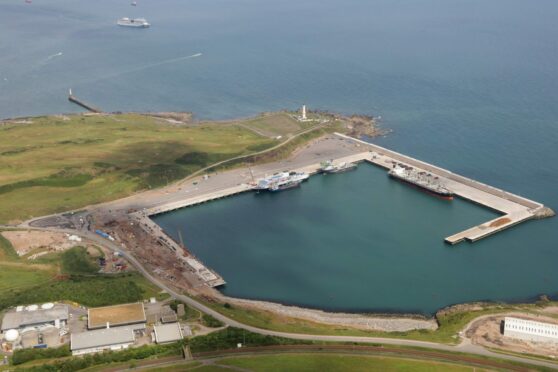Port of Aberdeen has the bold ambition to become the UK’s first net zero port by 2040. This means being an exemplar and targeting net zero emissions from vessels visiting the port (scope 3), as well as its own operations (scope 1 and 2).
-
Some Press and Journal online content is funded by outside parties. The revenue from this helps to sustain our independent news gathering. You will always know if you are reading paid-for material as it will be clearly labelled as “Partnership” on the site and on social media channels.
This can take two different forms.
“Presented by”
This means the content has been paid for and produced by the named advertiser.
“In partnership with”
This means the content has been paid for and approved by the named advertiser but written and edited by our own commercial content team.
The 2040 target is at the core of Port of Aberdeen’s net zero strategy which focuses on collaborating with stakeholders across the private and public sectors to reduce emissions in the port, facilitate future low carbon fuels and support the energy transition.
The port has committed £55 million over the next 10 years to achieve this, in addition to more than half-a-billion-pounds already invested in recent years to enhance its infrastructure.
Speaking at the launch of the net zero strategy in May 2023, Bob Sanguinetti, Chief Executive, Port of Aberdeen said: “Our vision is to become Scotland’s premier net zero port, offering world class facilities and services, at the heart of the nation’s energy transition. This transformational change will deliver significant benefits for the environment, local communities, and wider maritime sector.”
The scale of the challenge, and opportunity, is clear when targeting scope 3 emissions. This includes client vessel emissions and accounts for approximately 97% of the 55,000 tonnes of CO2 equivalent emitted from Port of Aberdeen in 2019 (baseline year).
The introduction of shore power at scale, starting with first power at three berths in 2024, and facilitating low carbon alternative fuels for client vessels are expected to generate significant reductions in emissions in the years to come.
However, achieving success in these areas will require a phased approach and strong partnerships with stakeholders across the public and private sector. Investment, incentives and policy will all be key to ensuring that the right infrastructure for the right vessels is available at the right time.
Cabinet Secretary for Net Zero and Just Transition Mairi McAllan said: “The Scottish Government is committed to the decarbonisation of the transport sector in a sustainable way, and the maritime sector has a vital role to play. An efficient and effective offshore energy sector is crucial for a robust economy, and our work to decarbonise the maritime sector will take account of the critical importance of this sector in our supply infrastructure. I wish Port of Aberdeen every success as they aim for their ambitious target of reaching net zero by 2040.”
Changes underway to hit net zero target
The port has already taken action to reduce the environmental impact of its operations, starting with the roll-out of electric vehicles and installation of LED lighting on the quaysides. A wide range of projects are now underway or planned, such as the trial of hydrotreated vegetable oil for port-owned vessels and equipment and exploring the feasibility of onsite energy generation for the port estate.
The new £420 million Aberdeen South Harbour has been designed to accommodate the low carbon fuels of the future. Service trenches are built into the entire length of the 1.5km quayside which removes the costly and time-consuming requirement to retrofit quays with service equipment, whether for shore power, hydrogen, ammonia, or another solution.
The port is nearing completion of an innovative, UK Government-funded feasibility study into decarbonising day-to-day operations at South Harbour. The study – delivered in partnership with Energy Systems Catapult, Connected Places Catapult and Buro Happold – is analysing future port power demands and assessing low carbon energy sources for equipment and quayside infrastructure to develop a roadmap for net zero operations.
Naveed Qamar, Head of Safety, Health, Environment & Quality, said: “Aberdeen has a leading role to play in the UK maritime industry’s path to net zero. All the major energy operator and supply chain companies are on our doorstep, and we have a common goal – reducing emissions and achieving net zero.
“There is a long way to go in delivering our 2040 ambition but I’m confident we can deliver it through our net zero strategy.”
